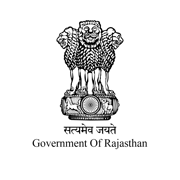About | Government of Rajasthan (Government of Rajasthan) , RAJASTHAN Check here latest notification
Exploring the Government of Rajasthan: A Comprehensive Overview
Introduction
Rajasthan, the land of kings, is renowned for its rich cultural heritage, majestic palaces, and vibrant traditions. However, beyond its historical grandeur, the state's administrative structure plays a pivotal role in its development and governance. The Government of Rajasthan, with its multifaceted departments and dedicated initiatives, strives to ensure the prosperity and well-being of its citizens.
Structure of the Government
The Government of Rajasthan operates under a democratic framework, headed by the Chief Minister. The state government is divided into three branches:
1. Executive Branch: Led by the Governor, who acts as the ceremonial head, and the Chief Minister, who is the real executive authority. The Chief Minister, along with the Council of Ministers, formulates and implements policies.
2. Legislative Branch: Consists of a unicameral system with the Rajasthan Legislative Assembly (Vidhan Sabha). The assembly has 200 members who are elected every five years. It is responsible for enacting laws and policies for the state.
3. Judicial Branch: The Rajasthan High Court, headquartered in Jodhpur, oversees the judicial functions. It ensures the rule of law and delivers justice through its subordinate courts spread across the state.
Key Departments and Their Functions
The Rajasthan government is divided into various departments, each focusing on specific sectors to ensure efficient governance. Some of the key departments include:
1. Department of Home Affairs: Manages internal security, law, and order through the police force and other security agencies.
2. Department of Education: Focuses on enhancing the quality of education, implementing policies for primary, secondary, and higher education, and promoting literacy.
3. Department of Health and Family Welfare: Ensures accessible healthcare services, implements health programs, and manages public health initiatives.
4. Department of Agriculture: Aims to boost agricultural productivity, supports farmers with subsidies, and promotes sustainable farming practices.
5. Department of Tourism: Promotes Rajasthan as a global tourist destination, preserves cultural heritage, and develops tourism infrastructure.
Major Initiatives and Programs
The Government of Rajasthan has launched several initiatives aimed at socio-economic development. Some noteworthy programs include:
1. Mukhyamantri Jal Swavlamban Abhiyan (MJSA): A water conservation initiative focused on making villages self-sufficient in water through rainwater harvesting and watershed management.
2. Bhamashah Yojana: Aimed at financial inclusion and women's empowerment, this scheme provides direct benefits transfer (DBT) to eligible beneficiaries.
3. Rajasthan Sampark: An online grievance redressal system that allows citizens to lodge complaints and track their resolution.
4. Rajasthan Jan Aadhaar Yojana: An integrated system for delivering various government services and benefits to citizens through a single card.
Challenges and Future Prospects
Despite its proactive approach, the Government of Rajasthan faces several challenges, including:
1. Water Scarcity: Rajasthan's arid climate makes water management a persistent issue, necessitating innovative solutions for sustainable water use.
2. Health Infrastructure: While significant progress has been made, improving healthcare accessibility and quality in rural areas remains a priority.
3. Education Quality: Ensuring quality education and reducing dropout rates, especially among girls, is crucial for the state's development.
Looking ahead, the government aims to leverage technology and innovation to address these challenges. By focusing on sustainable development, improving public services, and enhancing citizen participation, Rajasthan aspires to create a prosperous and inclusive future for all its residents.
Conclusion
The Government of Rajasthan, with its robust administrative structure and dedicated initiatives, plays a vital role in the state's progress. Through continuous efforts to address challenges and harness opportunities, it strives to create a better quality of life for its citizens while preserving the rich cultural heritage that makes Rajasthan unique.





